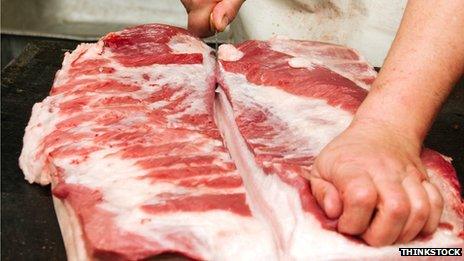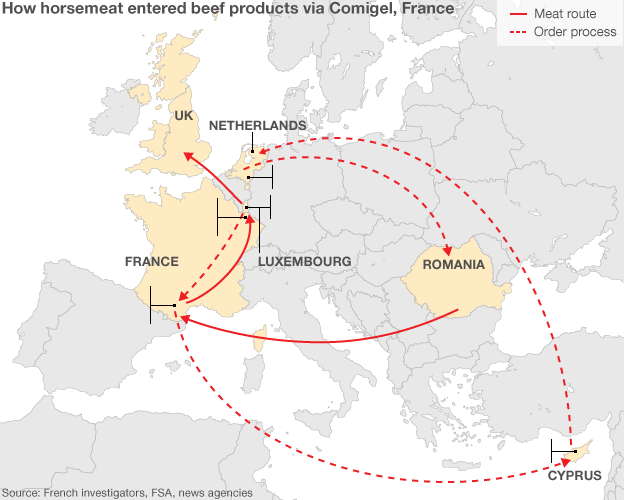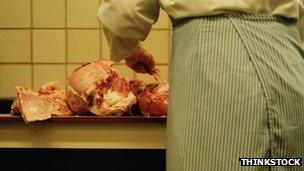Horsemeat scandal: Good news for butchers?
- Published

Independent butchers say demand for fresh meat is rising
After nearly a month in the news, Britain's horsemeat scandal shows no signs of abating, with the Food Standards Agency now calling for a "relentless" inquiry into how non-beef products ended up in supermarket burgers and big-brand processed food.
But are consumers starting to shun processed meat products - and the supermarkets that sell them?
Certainly there is a growing chorus of politicians - from all sides - urging families to abandon supermarkets in favour of independent family butchers.
Former Labour environment minister Ben Bradshaw has said he would not buy or eat processed beef products, because the government cannot offer assurances about what is in them.
"If people want to be confident about the meat they're eating they should buy fresh British meat, preferably local and from a trusted source," he said.
And Tory MP George Eustice - a member of the Environment, Food and Rural Affairs select committee - said: "There's growing concern about the provenance of meat products. This latest scare over horsemeat is the latest in a long line of similar problems.
"If people want to know for sure where their beef or pork comes from, their best bet is to support their local butcher, who will know where their meat is sourced."
There is some evidence - disputed by the supermarkets - that consumers are beginning to change their shopping habits.
Consultancy firm Kantar polled 6,221 people on 11 February - the day Tesco confirmed some of its spaghetti bolognaise products contained horsemeat.
Their results suggested one third of consumers were less likely to buy processed meat because of the horsemeat scandal, with 13% saying they intended to buy more locally sourced meat, and 5% intending to buy less meat altogether.
Independent butchers are also reporting a boost in demand - particularly for processed meat such as mince and burgers.
The Q Guild - which represents 110 of the "highest quality butchers in the UK" said freshly made beefburger sales have increased by up to 30%.
And Roger Kelsey - chief executive of the 13,000 member National Federation of Meat & Food Traders (NFMFT), said there was "definite evidence" consumers were looking for alternative supplies.
He estimated his members had enjoyed a 10-15% boost in their business since mid-January, with anything up to a 50% increase in the demand for sausages, mince and burgers.
The figures are challenged by the British Retail Consortium (BRC), which represents UK supermarkets.
BRC spokesman Richard Dodd said: "Our retailers say they haven't seen any big changes in buying patterns, although there has been more interest in burgers made of fresh meat, rather than frozen."
One of the main reasons advanced for why supermarkets and big brands like Findus have fallen victim to the horsemeat scandal is the length, and complexity, of their supply chains.
 1. Comigel: Food processor
3. Spanghero: Meat processor
2. Tavola: Factory
4. Subcontractor
5. Trader
6. Abattoirs
7. Supermarkets
1. Comigel: Food processor
3. Spanghero: Meat processor
2. Tavola: Factory
4. Subcontractor
5. Trader
6. Abattoirs
7. Supermarkets
French food producer makes order
Comigel HQ in Metz, north-east France, asks its subsidiary, Tavola in Luxembourg, to make food products - including beef lasagne for Findus.
Factory orders meat
The Tavola factory orders the meat from Spanghero in the south of France.
Subcontractor used
Spanghero contacts a subcontractor in Cyprus to source the meat.
Subcontractor enlists trader
The Cypriot subcontractor in turn contacts a trader in the Netherlands.
Trader orders from Romania
The trader in the Netherlands places an order for meat with abattoirs in Romania.
Abattoirs send meat to France
The meat from the abattoirs travels to Spanghero in France. However, Romania rejects claims that it was responsible for wrongly describing the horsemeat from its abattoirs as beef. Horsemeat is always labelled as such, they say. The Romanian authorities claim records show orders had been for horse carcass - easily distinguishable from beef.
Meat used to make products
Spanghero sends the meat to the Comigel subsidiary’s factory in Luxembourg before the finished products are supplied to Findus and retailers across Europe, including the UK. The president of Comigel says the company was unaware the meat was coming from abroad.
Horsemeat found in Ireland and UK
Tests by Irish authorities have found equine DNA in beefburgers made by firms in the Irish Republic and the UK. Traces of horsemeat have also been found in stored meat at another plant in Ireland and one in Northern Ireland. In mainland Britain, police and officials probing alleged horsemeat mislabelling have carried out raids at a slaughterhouse in West Yorkshire and a meat firm near Aberystwyth. Three men were later arrested on suspicion of offences under the Fraud Act..
It's now been revealed that meat destined for cheap frozen burgers and processed meals travelled through a dizzying maze of countries, food factories and sub-contractors.
Critics say this offered ample opportunities along the route for unscrupulous criminals to adulterate the beef.
Investigative food journalist Joanna Blythman told the BBC: "We have an industrialised food system which is essentially dysfunctional. It is predicated on global sourcing and sub-contracting along a long, long food chain, and it isn't being policed."
In contrast, independent butchers say because their supply chain is much shorter, they can offer their customers a guarantee that the meat they buy is genuine and free from adulterated products.
Butcher Tony Luckhurst sells English beef, sourced and slaughtered locally. He says he knows all his suppliers personally.

The horsemeat scandal might boost business for traditional butchers - but for how long?
Slaughtered animals arrive at his shop in Ealing, west London, with a plastic tag identifying the herd they come from. Mince is made on site, and there is no freezer on the premises, he said.
"I have sides of beef in my shop that came from 11 miles away," he said.
"There are only three people in my beef supply chain: I know the farmer, and I know the abattoir where the cattle were slaughtered.
"It's about knowing and trusting the people I do business with, and then passing that trust along to my customers."
Butchers like Tony are optimistic that bad news for the supermarkets and big-name brands could translate into better business for smaller, locally-owned enterprises, hit hard by the BSE crisis and competition from big out-of-town shopping centres.
The NFMFT estimates that the number of local butchers has fallen from 30,000 to just 6,000 in the last 20 years.
But, says Tony: "I have been a butcher for 43 years and feel more confident than I have ever been. People are now coming round to buying and shopping locally - it is the future."
Julia Glotz, Fresh Foods Editor of The Grocer magazine is more sceptical.
She said: "There is some anecdotal evidence consumers may be looking for different options - particularly opting for fresh beefburgers rather than frozen.
'No permanent change'
"But we haven't heard that demand for processed products is collapsing, and in any case, so many of them of them have been removed from the shelves it is impossible to calculate at present.
"I am not convinced we are looking at a permanent change in shopping habits."
Both she and NFMFT chief Roger Kelsey agree it is likely that once the current scandal is over, many consumers will revert to buying their meat from supermarkets.
But Ms Glotz said in order to rebuild confidence supermarkets needed to "fully and clearly identify" what went wrong with their supply chains, and name those responsible for adulterating their products.
Secondly, she said the government needed to ramp up controls and testing, as well as making sure consumers knew about sourcing policies, and who is involved in the supply chain.
But others go further. Journalist Joanna Blythman said: "Horsemeat is the problem now, but before it was BSE, and we really need ministers and the FSA to grasp that it is not a question of propping up the existing food system system but admitting that it doesn't work, and asking, what are we going to do about it?"
BRC spokesman Richard Dodd said: "Customer confidence matters a lot, which is why our members have stepped up their testing regime, and taken decisive and speedy action.
"The system is not fundamentally unsound. There is a rigorous traceability system in place, and it is not inevitable the supply lines will be compromised.
"There are enormous precautions and the incidents are being thoroughly investigated.
"To translate this incident into a condemnation of the whole system is a step too far."